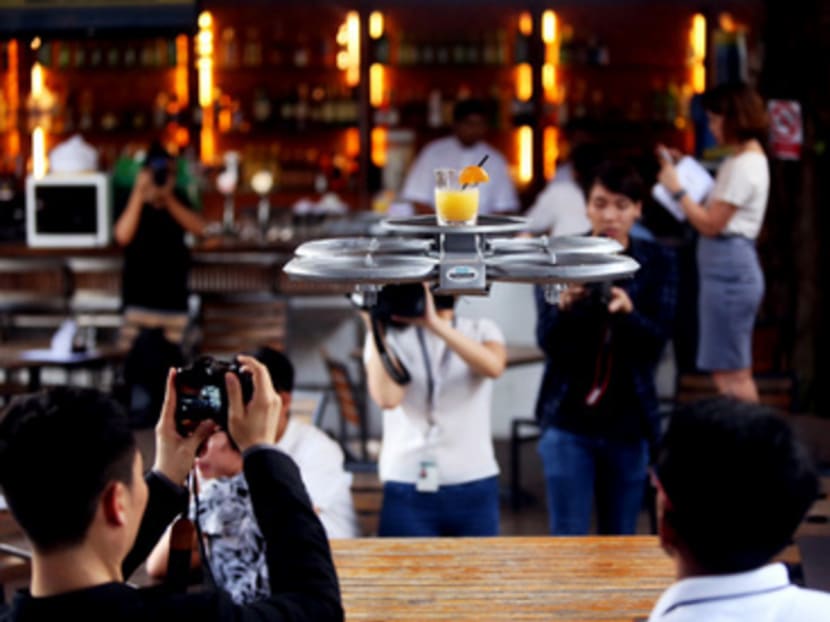Age of 'abrupt' automation: Future-proof your job to work alongside robots
Hardly a day goes by without reports of jobs being "automated" and taken away from workers. Chatbots are answering calls, algorithms are taking over from lawyers, and robots are making sushi. Whether you're a blue-collar worker or a high-level professional, you'll need to prepare to make sure you have a job as work becomes more automated.

An Infinium-Serve flying robot taking off from a bar with a plate of snacks during a media demonstration at Timbre @ The Substation.
Hardly a day goes by without reports of jobs being "automated" and taken away from workers. Chatbots are answering calls, algorithms are taking over from lawyers, and robots are making sushi. Whether you're a blue-collar worker or a high-level professional, you'll need to prepare to make sure you have a job as work becomes more automated.
Cognitive technologies and robotics as well as accelerating connectivity are all part of a seismic shift in how work is performed, the head of a top consultancy firm noted. Mr Punit Renjen, chief executive officer of Deloitte Global, said: "Almost every job will be re-invented as personal expectations of work evolve and human skills are augmented by technology."
Indeed, consulting firm McKinsey forecasts that 30 per cent of work could be displaced by automation by 2030.
Moreover, a recent survey by consultancy Willis Towers Watson found that about half of employers in Asia believe they will require fewer employees in the next three years due to automation, as artificial intelligence and robotics account for 29 per cent of work being done. Worryingly, only about half of those firms plan to "reskill" staff members whose work is being changed.
Author Molly Kinder, a senior advisor at New America, a United States think-tank, wrote on the Foreign Policy website that for people at the top, job growth will continue, and incomes will rise. Automation may even be life-enhancing for highly skilled workers, Kinder suggested, as virtual assistants take over administrative tasks and algorithms help simplify routine work. Automation may thus have less impact on jobs that involve managing people, applying expertise, and social interactions.
The transition will be painful, however, for workers at the bottom.
Wages will suffer as many occupations are automated and demand for lower-skilled routine labour gradually decreases.
Artificial intelligence poses a threat to low-income workers performing routine work or physical tasks in predictable environments such as clerks, cashiers, retail sales workers, administrative assistants, waiters, fast-food cooks, and assembly-line workers.
Perhaps surprisingly, activities susceptible to automation also include processing data, mortgage origination, paralegal work, accounting, and back-office transaction processing.
LEARN NEW SKILLS
The good news, futurist Jay Richards said, is that although there will be a disruption, technology will make work more fruitful.
The biggest challenge, however, is that the coming shift will be abrupt, since it will happen over the course of years rather than centuries, and half of today's jobs may disappear in the next few decades.
Given what we know of history and economics, he said "we should expect the future to offer far better prospects than we can now imagine".
And fortunately, Singapore is better-positioned than many countries. The Economist's Automation Readiness Index shows that Singapore is ranked as the third most prepared country in the world for the coming wave of intelligent automation, just behind South Korea and Germany.
The Economist praises Singapore for the SkillsFuture programme, where it says Singapore "is experimenting with funding 'individual learning accounts', which adults use to support training courses throughout their lives".
The more specific question, though, is how you can prepare for your own future and make sure that you continue to have a job amid the automation.
The key steps, a multitude of experts suggest, are to future-proof your job with training and to learn how to work alongside robots.
It is important to realise that even when some tasks are automated, you can keep your job by learning to perform new tasks rather than having your role taken away.
Even though employers expect automation to increase, more than half of the companies surveyed by recruitment firm The Manpower Group said that written and verbal communication skills as well as collaboration and problem-solving expertise will continue to be in demand.
Bolstering your social and interpersonal as well as teamwork and collaboration skills are important, since these abilities are likely to be needed and are hard to automate. Additional skills that are important include nurturing, caring, teaching, persuading, negotiating and selling.
Five steps can put you on the right path, the Huffington Post suggests: Get reskilled; take a "nanodegree"; go to code school to learn coding; don't forget soft skills; and be open to new things.
To figure out what to study, you can check with professional or industry associations to which you belong. It can also be helpful to find a mentor who can provide suggestions on areas that are most promising and the skills you need to develop.
Along with getting retrained by your company, you can use your SkillsFuture credit to take courses in fields that will prepare you for the future. You can find nanodegrees in areas such as engineering for self-driving cars or deep learning for artificial intelligence in online courses offered by organisations such as Udacity and Coursera.
And at work, ask your boss for new challenges or take on projects outside your usual role, rather than just waiting to be handed something, so that you can develop skills that relate to what you want to accomplish in the future.
While automation will clearly have an impact on jobs, there will be benefits for many people and new jobs are likely to be available. By preparing carefully for future changes, you may well end up doing work that you like better and that offers even more opportunities than before.









